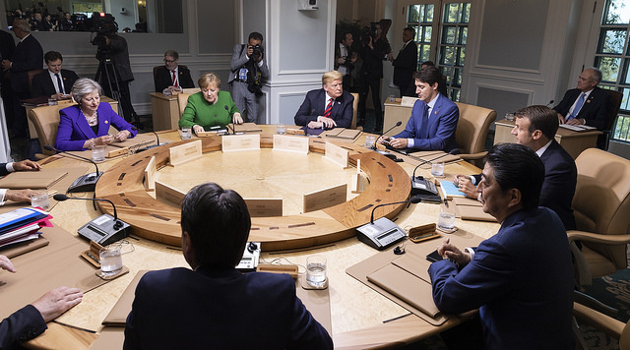Back in 2015, I wrote about the scandal involving former House Speaker Dennis Hastert and said we got the right result (legal trouble for Hastert) for the wrong reason (government spying on financial transactions).
Something similar happened over the weekend with the G-7 meeting.
Largely because of his misguided protectionist views, Donald Trump refused to sign a joint statement with the other G-7 leaders (Germany, France, Italy, Canada, Japan, and the United Kingdom).
Trump’s protectionism is deeply troubling. It threatens American prosperity and could lead to tit-for-tat protectionism that caused so much damage to the global economy in the 1930s.
That being said, we shouldn’t shed any tears because a G-7 Summit ended in failure or that Trump didn’t sign the communique.
To be sure, the vast majority of the language in these statements is anodyne boilerplate. Sort of the international equivalent of “motherhood and apple pie.”
But it’s not all fuzzy rhetoric about “inclusive growth” and “clean water.” The bureaucrats who craft these statements for their political masters regularly use the G-7 to endorse statist policies.
 It’s all very reminiscent of what Adam Smith wrote about how people in the same profession would like to create some sort of cartel to extract more money from consumers.
It’s all very reminiscent of what Adam Smith wrote about how people in the same profession would like to create some sort of cartel to extract more money from consumers.
But Smith went on to explain that such efforts can’t succeed in the private sector unless there is some sort of government intervention to prohibit competition.
Unfortunately, when politicians meet to craft cartel-type policies to extract more money from their citizens, they rely on the power of government to enforce their anti-market policies.
Let’s look at some of the dirigiste language in the communique from this weekend, starting with the ever-present embrace of class warfare tax policy and support for tax harmonization.
…support international efforts to deliver fair, progressive, effective and efficient tax systems. We will continue to fight tax evasion and avoidance by promoting the global implementation of international standards and addressing base erosion and profit shifting. …We welcome the OECD interim report analyzing the impact of digitalization of the economy on the international tax system.
Keep in mind that “international standards” is their way of stating that low-tax jurisdictions should have to surrender their fiscal sovereignty and agree to help enforce the bad tax laws of uncompetitive nations (such as G-7 countries).
And the BEPS project and the digitalization project are both designed to help other governments skim more money from America’s high-tech companies.
The G-7 communique also endorsed the anti-empirical view that more foreign aid and higher taxes are necessary to generate more prosperity in the developing world.
Public finance, including official development assistance and domestic resource mobilization, is necessary to work towards the achievement of the Sustainable Development Goals of the 2030 Agenda.
The statement also recycled the myth of a big gender wage gap, even though even the female head of Obama’s Council of Economic Advisers admitted the wage gap numbers are nonsense.
Our path forward will promote women’s full economic participation through working to reduce the gender wage gap.
And there was the predictable language favoring more government intervention in energy markets, along with a threat that the hypocritical ideologues at the United Nations should have power over the global economy.
We reaffirm the commitment that we have made to our citizens to reduce air and water pollution and our greenhouse gas emissions to reach a global carbon-neutral economy over the course of the second half of the century. We welcome the adoption by the UN General Assembly of a resolution titled “Towards a Global Pact for the Environment” and look forward to the presentation of a report by the Secretary-General in the next General Assembly.
Given the G-7’s embrace of one-size-fits-all statism and government cartels, let’s look at how Professor Edward Prescott (awarded the Nobel Prize in economics in 2004) modified Adam Smith’s famous quote.
I’ll close by reporting that I asked several experts in international economics, mostly from the establishment (and therefore instinctively sympathetic to the G-7), whether they could tell me a single pro-growth accomplishment since these meetings started in the 1970s.
They couldn’t identify a single concrete achievement (several said it was good for politicians from different countries to develop relationships and some speculated that useful things may get done in so-called side meetings, but all agreed those things could – and would – happen without the G-7).
So why spend lots of money just so a bunch of politicians can have an annual publicity photo? And why give their retinues of hangers-on, grifters, hacks, and bureaucrats a taxpayer-financed annual vacation?
Needless to say, I’d much rather focus on defunding the OECD or defanging the IMF. But if Trump’s nonsensical protectionism somehow leads to the disintegration of annual G-7 schmooze-fests, I’ll view that as a silver lining to an otherwise dark cloud.


